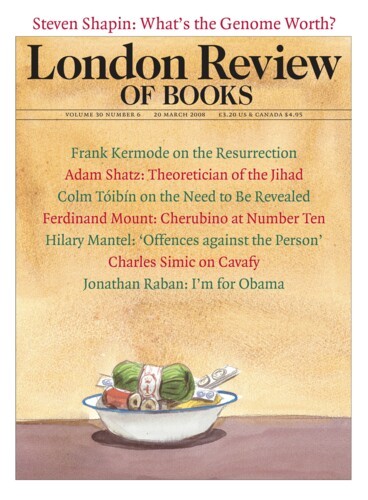If you are an Inuit or a hummingbird, you are very unlikely to die of heart disease, suffer from diabetes, or be extremely fat. You are also unlikely to drive a Bentley down the Brompton Road, but that’s not what interests the world’s top foodies, who look to ruddy Eskimos and buzz-winged birds to explain the success of a diet rich in Omega-3. Foodies are responsible for thousands of books every year, which people buy in droves, expecting to learn the secret of eternal happiness, but by and large these books always have the same message: eat fish and plants. Most of the other stuff in supermarkets should just be binned.
A recent, very austere contribution by Michael Pollan, In Defence of Food (Allen Lane, £16.99) argues that one should only eat things that have been nourished by sunlight. But what are creatures that are allergic to sunlight supposed to do? I don’t mean moles, who will occasionally make their way to the surface on foraging missions, but creatures who are genuinely hurt by conditions outside. I don’t mean hedgehogs, I don’t mean woodlice: I mean students. It’s all right for those square-jawed Californian eco-warriors, traipsing through the redwoods in Ugg boots looking for nuts, but what about those ill-shod, pallid, extension-hungry dwellers in halls of residence?
Behold: The Student Cookbook (Hamlyn, £6.99), a book that is too busy forking the veggie sausages even to have a named author. ‘Your clothes and CDs are packed,’ says the no-messing-about introduction, ‘you’ve said goodbye to your mates and you’re looking forward to three years of late nights, undisturbed lie-ins and no nagging about cleaning your room … and, with cheap lager at the Student Union, freshers’ week, and working out where you’re supposed to be and when, the last thing on your mind is going to be cooking.’
Yet the Student Cookbook wishes to imagine a world in which the orange part of a vodka and orange mustn’t count as your daily intake of Vitamin C. Salade Niçoise takes ten minutes to prepare and 15 minutes to cook. It can then be described as ‘posh’, ‘fresh’ and ‘yum’. Quick Pasta Carbonara only takes 20 minutes and is totally sexy. After a morning of The Tweenies and an afternoon of Structuralism, worn-out readers are offered a simple way into Tofu Ragout, Tequila Chicken in a Pine Nut Sauce (featuring ‘2 gingernut biscuits’) or a synapse-erupting Beer-Braised Beef with Cheese Dumplings. If you have 30 minutes before EastEnders, you might knock up a Turkey and Orange Stir-Fry (‘fruity’, ‘posh’) and snuggle under the communal duvet with a Pineapple Upside-Down Pudding, made from the kind of fruit you find in a tin.
This all sounds perfectly fine, so long as you don’t listen to Michael Pollan. Yet fastness and unpretentiousness is becoming one of the modes of popular cookbooks. Delia Smith’s How to Cheat at Cooking (Ebury, £20) is a cheeky, slackerish affair from Britain’s queen of practicality. (Chapter 5 is called ‘Uncool – What Mums Used to Make’.) Maybe Delia feels that concessions have to be made to the gathering backlash against ethical bullying in foody matters – which might also explain why she allows McDonald’s to take out advertisements on her website – but it might be even simpler than that. Delia wants to get down with the kids, Jamie Oliver style, and the best way to do that is to tell them their bad habits are kind of cool.
The last chapter of her new book is called ‘Sweet Cheats: Ending on a High’, which might, inadvertently, appeal to the culinary instincts of those young rebels currently snapping up The Cannabis Cookbook by Tim Pilcher (Pocket Books, £9.99), ‘recipes so delicious, nothing will ever get wasted – except your dinner guests’. ‘They’ve outlawed the number one vegetable on the planet,’ Timothy Leary once moaned, though, technically, grass is a fruit. The perfect student menu could go something like this:
Really Wild Mushroom Sauté
* * *
Pot Pesto & Herb Pasta
* * *
Mad For It Moroccan Majoun
The mushroom starter has cannabutter (made with powdered cannabis) and can include shitake, oyster, porcini and trompettes de mort, though ‘the magical variety of mushroom could go in here too for the more experienced and hardy psychonaut.’ Delia would be proud of her new friends’ simplicity and economy. ‘In a dry frying-pan,’ we are advised for the preparation of the majoun, ‘the cannabis is toasted over a very low heat until it begins to release an aroma.’
Anti-foodyism is the fad of the season, a fad directed at the hearts and minds of the nation’s youth, who nevertheless borrow some of their preachy punctiliousness from their parents and their constant fussing about the organic box. I caught up with some students the other day to see how they were coping out of the sunshine. ‘You mustn’t forget Cooking with Booze (Snowbooks, £9.99),’ one of them said. ‘Especially the recipe for Conyngs in Greke Wine – it’s awesome.’
‘Are you serious?’
‘Yeah, man. It was one of the main courses at the coronation of Henry IV in 1399. Seriously good. Served with rice for four people.’
‘And the Mojito cupcakes,’ said his sidekick. ‘Totally amazing.’
A quick call to the bookshops of Oxford reveals that they’re doing a decent trade in Heinz Baked Beans (Hamlyn, £6.99), but my relief at the survival of old customs was short-lived when I studied a copy. Bean and Red Pepper Sushi, anyone? Pumpkin, Bean and Tomato Risotto? Just goes to show: backlashes are seldom really backlashes nowadays, being more like appropriations: from the point of view of the brazen youth, the job is to make rebellion taste as much as possible like recent convention.
Send Letters To:
The Editor
London Review of Books,
28 Little Russell Street
London, WC1A 2HN
letters@lrb.co.uk
Please include name, address, and a telephone number.

